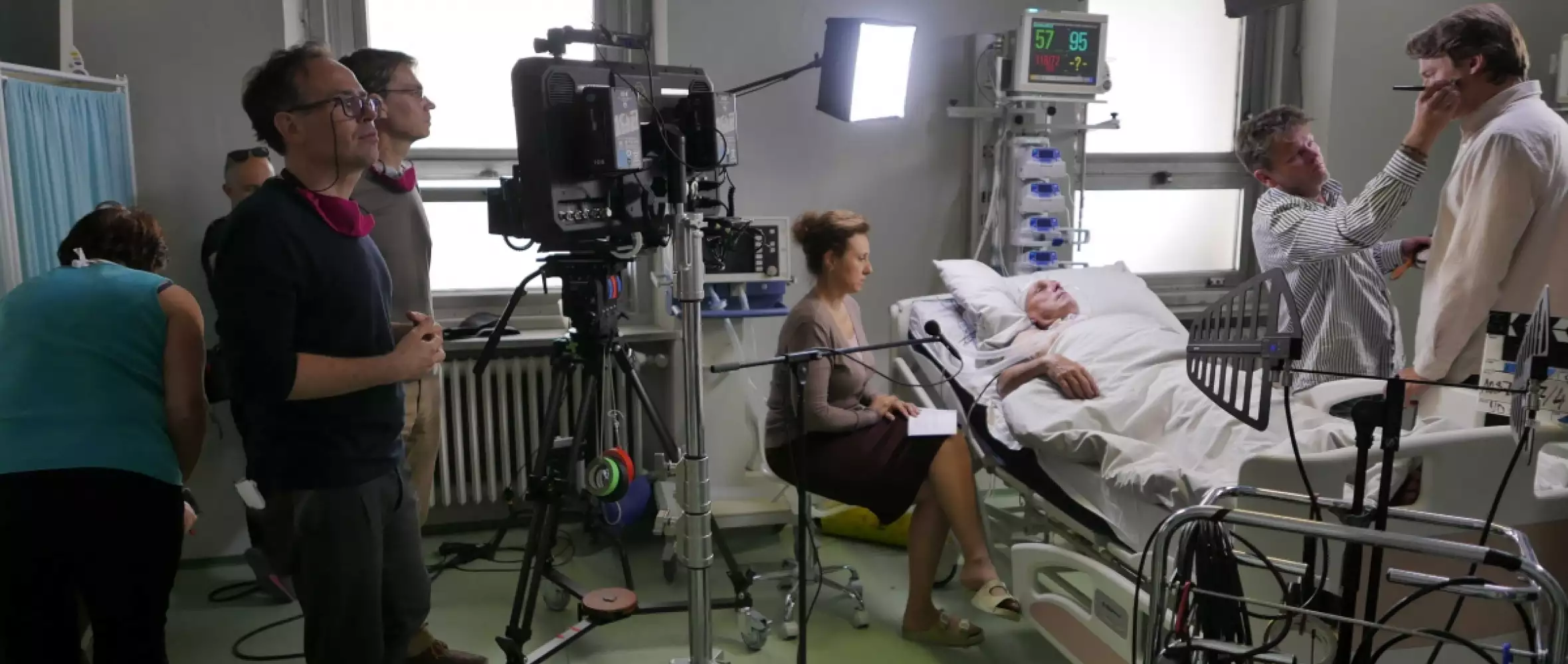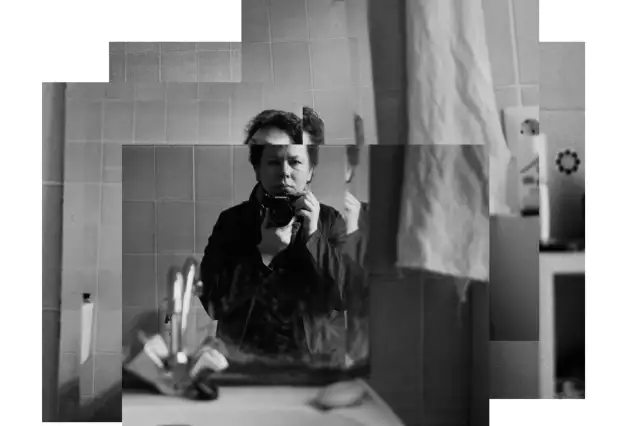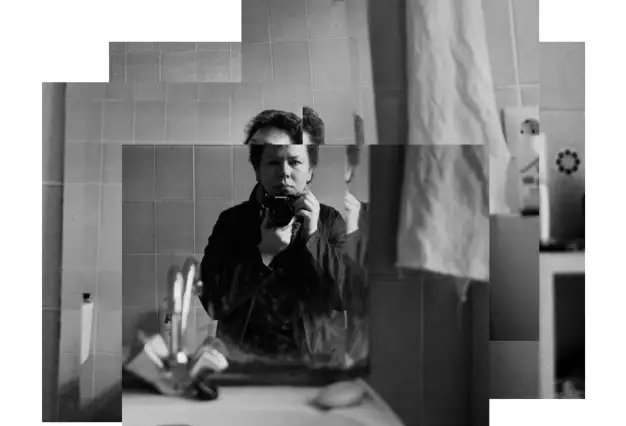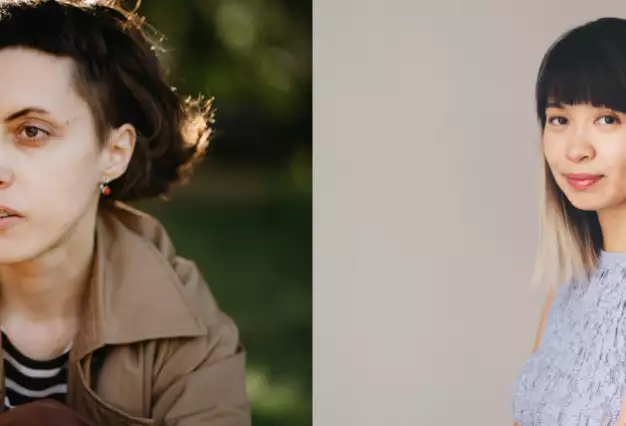
01 December 2020
Saving a film that was dead in the time of Corona
Saving a film that was dead in the time of Corona

The third feature film from director-screenwriter Václav Kadrnka has taken some hard knocks. The impulse for making it was his father’s brush with death. The shoot itself was put on hold for nearly two months due to coronavirus measures. Coming after Kadrnka’s films Eighty Letters and Little Crusader, the intimate drama Saving One Who Was Dead completes a loose trilogy.
Article by Vojtěch Rynda for CZECH FILM magazine / Fall 2020
In the summer of 2016, Václav Kadrnka’s father suffered a serious stroke that left him in a coma. “He didn’t want to wake up for a long time,” Kadrnka recalls. “My mom and I would go to see him in hospital and tried summoning him back to us. We looked for the words he used, we looked for a way to call him back. We didn’t know if he could hear us, or if we were even worthy of it. In the intensive care unit you are under a lot of pressure and try to find courage within yourself. When a miracle occurred and dad came out of it, it provided a great deal of inspiration for my new film.”
Kadrnka’s film is entitled Saving One Who Was Dead. The fact that the title gives away the ending was intentional: “I believe that cinema is more about sharing the filmmaker’s vision than storytelling and massive epic narration.” As Kadrnka sees it, it’s not so much the father who is saved in the film as his wife and son: the rescue lies in the acceptance of the situation at hand.
While Kadrnka Sr. was recovering, the director was at work on the postproduction of his previous film, Little Crusader. That film went on to win the Crystal Globe at the 2017 Karlovy Vary festival and was shown at other festivals as well. Kadrnka took advantage of his festival travels to also participate in pitching forums and industry events where he presented his new film project, including its first visuals in the form of authentic photos of his father in hospital.
“For example, I was invited to the MIA Market in Rome where Little Crusader was the first Czech project ever and immediately won,” says the director. He co-wrote the screenplay with writer Marek Šindelka in order to get some distance from the highly personal story.
In 2018, the screenplay for Saving One Who Was Dead won the HAF Award, the main prize at the Asia Film Financing Forum Hong Kong, where Kadrnka also made the initial contacts for world sales. The award came as something of a surprise since there was no Asian element in the script.
“They chose it based solely on the theme,” the director recalls. “Hong Kong showed me that this is a topic shared worldwide. We all know what it’s like to be worried about a loved one or ourselves, to be hanging around a hospital corridor, coming to terms with your anxieties, fear, uncertainty, and the proximity of death.”
Saving One Who Was Dead then received financing from the Czech Film Fund (€217,308) and Czech Television. The film is now being produced as a coproduction between Kadrnka’s own company Sirius Films and the Slovak production house SilverArt and also has the support of the Regions of Olomouc and Zlín and the Slovak Audiovisual Fund. The director chose Zuzana Mauréry and Vojtěch Dyk for the lead roles of the patient’s wife and son.
“I never hold auditions,” says Kadrnka. “I meet with actors who I pick out myself and I might see a lot of their shows in the theatre. And things resonated immediately with Zuzana and Vojtěch, right from the start I felt like they could internalize the theme – thanks in part to their own personal experiences. With the casting, I look more for a moral or personal connection to the material rather than dazzling acting.”
Kadrnka considers the other main character to be a historical building more than 120 years old – the unused Franz Josef pavilion of the hospital in Olomouc where shooting took place. The building was scheduled for demolition and so the filmmakers were able to adapt it whichever way they needed.
“It was a pragmatic location, the hospital lent us lots of props, but it was also important to me that it was a real hospital,” says Kadrnka. “You could feel the atmosphere, that people had been born and died there. I would not have been able to capture anything like that in a modern building or studio.”
The onset of the coronavirus pandemic in mid-March of 2020 hit both filmmakers and hospitals hard: after 10 days of shooting the crew had to abandon their work and one of the floors of the Franz Josef building became an intensive care unit for patients with suspected COVID-19. Due to the closure of the borders, Zuzana Mauréry was unable to return to the set from her home in Slovakia and the filmmakers could no longer stay in hotels. Kadrnka tried hard to find a way to continue the shoot. Among other things, he considered having the actors wear masks as part of their roles: after all, the film is set in an intensive care unit. The director’s wife found a doctor who could be on set and keep an eye on things, but the situation created an uncertainty that left the crew, and particularly the actors, with a mental block.
Kadrnka got a lot of support from the film’s French cameraman, Raphaël O'Byrne, who stayed in the Czech Republic throughout the enforced suspension of the shoot. “We kept on looking for ways to finish the film,” the director recalls. “We tried filming some material with my dad and I was considering completing it as a documentary with my own family in it.”
O'Byrne, meanwhile, lived in the Kadrnka family’s flat in Zlín with his girlfriend from Berlin, who was writing her dissertation on astronomy; he learned to play the guitar and got to know the Czech Republic. “He is an artist through and through, who doesn’t give in to fear and looks for ways to finish what he’s started,” says Kadrnka of him.
Mauréry finally received an exemption and was allowed to cross the border and return to the shoot. Maintaining strict hygiene rules, like disinfecting the set, the crew was able to get back to work in early May. Throughout the break, Kadrnka refused to look at the material they had already shot. “I told myself I wouldn’t analyse it, I’d just pick up where we left off and keep going.”
Saving One Who Was Dead was the first film to return to a suspended shoot and also the first to wrap. “We had to have fewer shooting days, so we ended up cutting ten from the originally planned 36, which meant doing fewer shots and fewer takes, and I also had to rewrite and simplify certain scenes,” Kadrnka explains. One big advantage during the crisis situation was that the entire film is set indoors at a single location: “It helped that we were a small crew with a small project that used just one location, timeline and plot.”
Though Kadrnka was not knowingly attempting a trilogy, Saving One Who Was Dead has much in common with his previous films. “I’ve realized how the themes of the absence of a loved one cleaves to me,” he says.
His autobiographically oriented debut, Eighty Letters, is about a mother and son trying to get permission to leave communist Czechoslovakia for the West where their father and husband is. Little Crusader is a meditative road movie about a medieval knight looking for his missing son.
“The theme is one of family, in which one member is missing and the others are looking for him,” Kadrnka explains. “The films are very similar in terms of form as well, for instance by using spacing to reflect the characters’ situations. There is also a distinct absence of “home” in all three films. And they are all, in their own way, road movies: in Saving they are wandering around and scouring the hospital corridors.”
Kadrnka wants his new film to show, in his own words, that one should never give up and that apparently senseless things can make sense. This is something he says of both the situation, with his father in the coma that was the film’s genesis, and also of the complicated way the film has come to fruition.
“If a film is meant to be made, then it will be made,” he argues persuasively. “That’s not just some catchphrase or something esoteric - that’s how it works. Film has great power to embody certain conditions of the filmmakers.”
During the second stage of the shoot, the filmmakers learned that their project had received support from the European cultural fund, Eurimages, to the tune of € 130,000. That amount covers postproduction, the financing of which no one had been concerned with much until then. Saving One Who Was Dead is scheduled to have its premiere in 2021.




